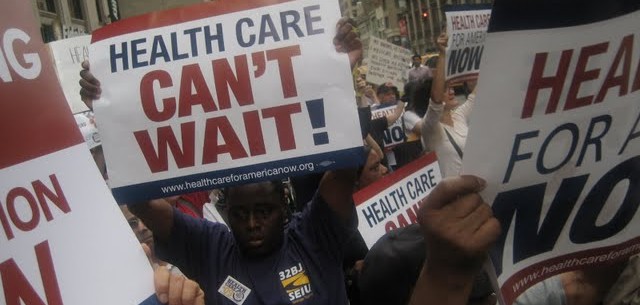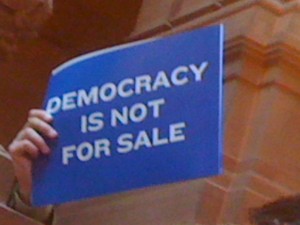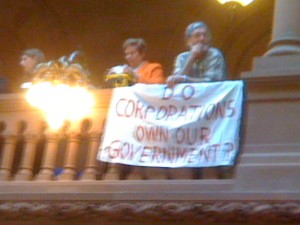Political activists of various stripes who work on various issues, including health care, converged at the top of the “Million Dollar Staircase” inside the State Capitol on March 11th to demand that lawmakers clean up Albany politics. They called on legislators to move forward with a plan to curtail the influence of “Big Money” in election campaigns, and replace it with a system of public matching funds linked to small donations collected from constituents. Known as a “Fair Elections” approach, the plan would replicate a system in New York City that has been in place for well over a decade and take it statewide. The result in the City has been to completely transform municipal government so that it is much more reflective of the city’s demographics, and much more responsive to everyday residents’ concerns and priorities, such as access to affordable health care.
Before a throng of cameras and reporters, State Assembly Speaker Sheldon Silver addressed an enthusiastic crowd of over 200 people who were jammed into the stairwell and hanging over balconies. He announced that the Assembly was including a Fair Elections proposal in its own just-released budget bill (to be voted on by the end of the week), saying it was time to “get it done.” Over the past decade, there have been numerous financial corruption scandals involving leaders and members of the State Legislature, leading to indictments, resignations, convictions, and jail time.
A Fair Elections proposal has been enacted by the State Assembly numerous times over the past decade, and Governor Cuomo included such a proposal in his own proposed budget released in January. It will now go forward into final negotiations with State Senate leaders where there are differences within the coalition governing majority comprised of Republicans and five (renegade) Independent Democrats. Here in New York City, there is only one Republican Senator (Martin Golden of Brooklyn), and three Independent Democrats (Jeff Klein of the Bronx, who leads the faction, Diane Savino of Staten Island and southwest Brooklyn, and Tony Avella of eastern Queens.) The budget process is to be concluded by the end of March when the new fiscal year begins for the state on April 1.
Issue advocates, including those who work on health care reform, have long believed that many of our aspirations and good ideas to make things better for everyday New Yorkers have been stopped dead in their tracks because of the inordinate influence of Big Money forces, such as millionaires and large, powerful corporations. Historically, they have had disproportionate sway over individual legislators because of the money they contribute to candidates’ election campaigns. In the area of health care, many believe New York would have enacted a truly universal health care program years ago had it not been for the dominance of the insurance companies and other stakeholders striving to protect, if not expand, their profiteering off the health care system. While New York has certainly been a “leader state” in the area of health care compared to most other states, prospects for much more progress will be possible under a Fair Elections system because elected officials will be much more beholden to the electorate rather than Big Money donors. We look forward to that day with eagerness and hope.


